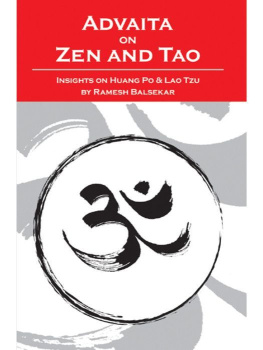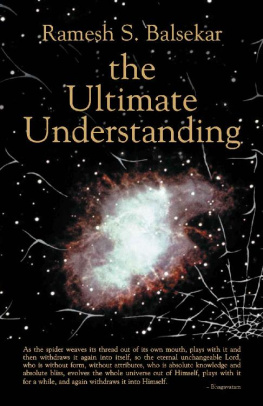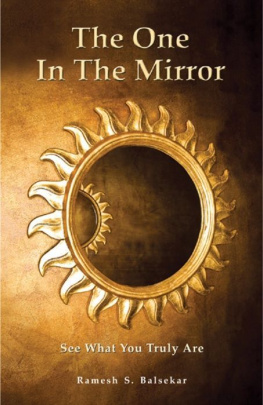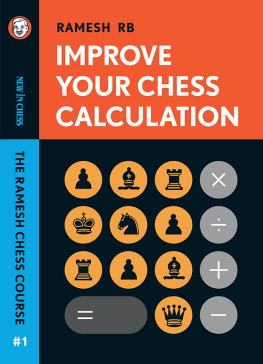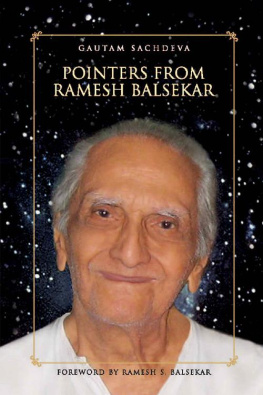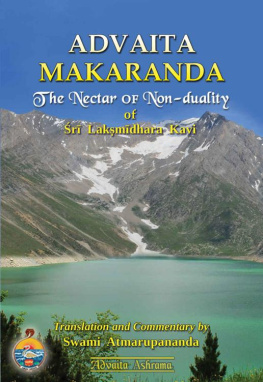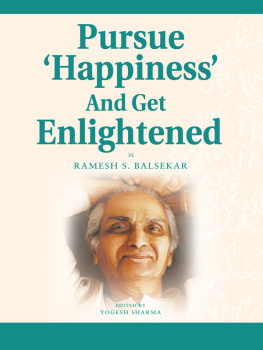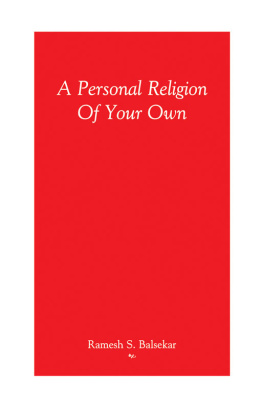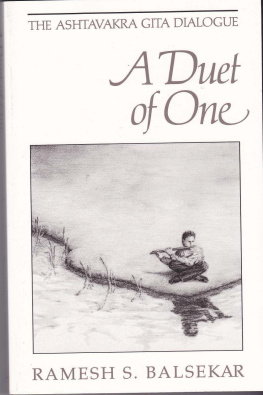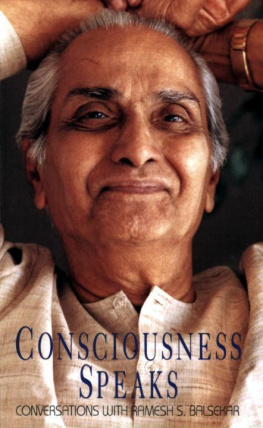Ramesh Balsekar - Advaita On Zen And Tao
Here you can read online Ramesh Balsekar - Advaita On Zen And Tao full text of the book (entire story) in english for free. Download pdf and epub, get meaning, cover and reviews about this ebook. year: 2012, publisher: Yogi Impressions, genre: Religion. Description of the work, (preface) as well as reviews are available. Best literature library LitArk.com created for fans of good reading and offers a wide selection of genres:
Romance novel
Science fiction
Adventure
Detective
Science
History
Home and family
Prose
Art
Politics
Computer
Non-fiction
Religion
Business
Children
Humor
Choose a favorite category and find really read worthwhile books. Enjoy immersion in the world of imagination, feel the emotions of the characters or learn something new for yourself, make an fascinating discovery.
- Book:Advaita On Zen And Tao
- Author:
- Publisher:Yogi Impressions
- Genre:
- Year:2012
- Rating:3 / 5
- Favourites:Add to favourites
- Your mark:
- 60
- 1
- 2
- 3
- 4
- 5
Advaita On Zen And Tao: summary, description and annotation
We offer to read an annotation, description, summary or preface (depends on what the author of the book "Advaita On Zen And Tao" wrote himself). If you haven't found the necessary information about the book — write in the comments, we will try to find it.
Advaita On Zen And Tao — read online for free the complete book (whole text) full work
Below is the text of the book, divided by pages. System saving the place of the last page read, allows you to conveniently read the book "Advaita On Zen And Tao" online for free, without having to search again every time where you left off. Put a bookmark, and you can go to the page where you finished reading at any time.
Font size:
Interval:
Bookmark:

Edited by
Gary Roba and Gautam Sachdeva


ADVAITA ON ZEN AND TAO
First published in India in 2008 by
Yogi Impressions Books Pvt. Ltd.
1711, Centre 1, World Trade Centre,
Cuffe Parade, Mumbai 400 005, India.
Website:
Published by Yogi Impressions
First Edition, April 2008
Copyright 2008 by Ramesh Balsekar
Book design: Priya Mehta
All rights reserved. This book may not be reproduced in whole or in part, or transmitted in any form, without written permission from the publisher, except by a reviewer who may quote brief passages in a review; nor may any part of this book be reproduced, stored in a retrieval system, or transmitted in any form or by any means electronic, mechanical, photocopying, recording, or other, without written permission from the publisher.
Contents


PREFACE
The Chn Chou Record is a short diary written by Pei Hsiu detailing the talks he heard of the great Zen Master Hsi Yn, sometime around 850CE in the city of Chn Chou, China. Hsi Yn lived as a hermit for many years on Mount Huang Po, and became known posthumously by that name alone. He is regarded as one of the great masters of the southern branch of the Zen sect of Buddhism, which taught the doctrine of non-duality, or sudden enlightenment.
Just as English is recognisably the same language whether spoken in America, England, or India, the various teachings of non-duality, whether from Lao Tzu, Bankei, or Ashtavakra, all point to the same non-conceptual Truth. Consider the following, The existence of things as separate entities or not as separate entities are both dualistic concepts a man drinking water knows well enough if it is cold or warm. This quotation of Huang Po (Wan Chi Record, 50) could easily have been written by Ramesh S. Balsekar, the modern Indian Advaita Master. In the following pages, Ramesh brings home this point in his commentaries on the Chn Chou Record. He begins each section by paraphrasing the original wording of Huang Pos talks, and then goes on to elucidate its meaning in the conceptual framework of Advaita Vedanta.
A few reference points to differences in the wording of some key concepts may be helpful: Zen uses the word Mind to refer to what Advaita calls either Consciousness or Impersonal Awareness, and uses mind for what Advaita would call the personal consciousness, or ego (which in the ordinary person is based on the sense of personal doership and the thinking mind). Where Huang Po says, When body and mind achieve spontaneity, the Way is reached, and Mind is understood(chpt. 29), Advaita might say, In the absence of the sense of personal doership, all actions are seen to be spontaneously arising appearances in Consciousness, Awareness-in-motion, which is all there is. And, when Huang Po uses the word Buddha, as in, The Ever-Existent Buddha is not a Buddha of form or attachment (chpt. 2), he is not referring to a man who lived in India 2500 years ago. Similarly, Ramesh does not mean a very old man with a white beard passing judgement on sinners when he uses the word God. They are both referring to the Source Eternity pure Subjectivity devoid of any objectivity, which is what we truly Are.
INTRODUCTION
By Ramesh Balsekar
In the teachings of the Zen Masters can surely be seen the brilliant exposition of some valid inner realisation of the basic Truth, not unlike the exposition of the same basic Truth in Advaita, by masters like Adi Shankaracharya and the sage Jnaneshwar. Indeed, there is the theory that Bodhidharma arrived in China bringing with him a doctrine of great antiquity from India.
Huang Po is regarded by many as the founder of the great Lin Chi (Rinzai) Sect which still continues in China and flourishes widely in Japan. Huang Po is generally known in Japan as Obaku.
Zen followers are not content to pursue Enlightenment through eons of varied rebirths, inevitably burdened with pain and ignorance, app roaching with infinite slowness the supreme experience which Christian mystics have described as union with the Godhead. They believe in the possibility of the happening of full Enlightenment through going beyond conceptual thinking and grasping the Intuitive Understanding.
This book has been broadly based on The Zen Teaching of Huang Po, translated by John Blofeld in 1958.
The Master said, All sentient beings, including the Buddhas, are in reality nothing but the One Mind: It is all that exists. This Mind is without beginning and is indestructible. It has neither form nor colour, and transcends all attributes and comparisons. It is That which exists before you, the boundless void that cannot be measured; start thinking about it and you fall into error.
The sentient beings, attached to form, seek externally for Buddhahood, and are not aware that whatever they do for a full eon, they will be frustrated. They do not understand that if only they stop their conceptualising and worrying, they will realise that the One Mind is the Buddha and the Buddha is all living beings. This One Mind is not greater in the Buddha and smaller in the ordinary man.

According to Advaita:
a) I dream the universe, and all that is dreamt is I I who am but not as a me; you perceive the universe, but you ARE only as I and not as any you.
b) I alone can look, but I do not see what is seen by a me; I alone can speak, but I do not say what is said by a me; I alone function, but I do not do what is done by a me. I AM, but there is no me or you or him or her.
c) I am the seeing of all that is seen; the hearing of all that is heard; the knowing of all that is known or can be known; I am the Awareness of all that is aware, the conceiving of all that can be conceived and, therefore, I cannot be conceived.
I can only be conceived as AWARENESS, unaware of being aware.
You are the Buddha-Mind, fundamentally complete in all respects; it is futile to supplement that perfection by any meaningless practices like performing the six paramitas (charity, morality, patience under affliction, zealous application, right control of mind, and the application of the highest wisdom), and many similar practices, or gaining merits as countless as the sands of the Ganga. You may perform them whenever you like performing them, but not under compulsion. Otherwise, your way of thinking is not compatible with the Way. To make use of your mind and think conceptually is to attach yourselves to the form and miss the substance. The ever-present Buddha is not a Buddha of form. Just awake to the One Mind, and there is nothing whatsoever to be attained.
The Buddha and all sentient beings are the One Mind and nothing else.

According to Advaita, what is at the root of bondage and unhappiness is the sense of personal doership, the notion of volition. The entire mechanism of daily living is based on the notion that volition is behind every act of the human being and that, therefore, he is responsible for those acts. The fact of the matter, however, is that human beings do not act but react to an outside stimulus. Most of the time living, for most people, is conditioned by a series of reflexes based essentially on instinct, habit and even propaganda. The scope of deliberate, considered action is in actual life extremely limited, and yet almost every person firmly believes that he is the doer, and it is for this reason that the sage Ashtavakra refers to this notion of individual volition as the bite of the deadly serpent, the ego.
Next pageFont size:
Interval:
Bookmark:
Similar books «Advaita On Zen And Tao»
Look at similar books to Advaita On Zen And Tao. We have selected literature similar in name and meaning in the hope of providing readers with more options to find new, interesting, not yet read works.
Discussion, reviews of the book Advaita On Zen And Tao and just readers' own opinions. Leave your comments, write what you think about the work, its meaning or the main characters. Specify what exactly you liked and what you didn't like, and why you think so.

